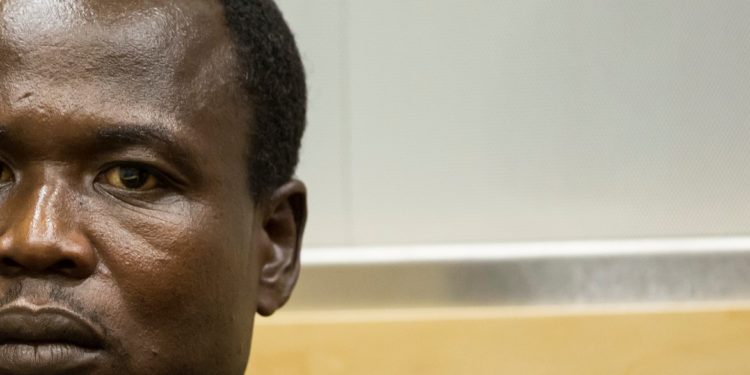By Susan Kendi
Soldiers fleeing the Lord’s Resistance Army would receive a blanket, a hoe, a machete, two saucepans and 265,000 Uganda Shillings ($73).
On top of that, they would receive an Amnesty Certificate and a form in which they would fill their personal information and where they had been, a witness told judges at the International Criminal Court on January 26, 2016. Amnesty certificates were used as proof that a defector was no longer an LRA fighter, he added.
“I do not know if I am going to be prosecuted. I don’t know if [the] amnesty certificate [protects] me from prosecution but if they prosecute me in future, what right do I have not to come to court?” Witness P-016 told lawyer Kryspus Odongo, who is representing former LRA commander Dominic Ongwen at the ICC.
The witness, who is was testifying under a protected identity with voice distortion and face pixilation to give him anonymity, revealed that he was sent to the frontline but was shot, ironically giving him an edge for selection as a signaler.
“We were trained on the TONFAS Code, assigned to different commanders and [we then] trained the rest of the LRA soldiers on how to use a radio,” he said.
The signalers’ training entailed how to configure messages using the TONFAS code to ensure confidentiality and interception but technical aspects of radio communication were not taught.
The prosecution witness said it was difficult to recognise voices in recordings when one was speaking in undertones or against background noise but after listening, you can easily identify the voice of the person speaking. He said had met Ongwen past puberty, when both their voices had broken: “I was no longer 12 years old; I was 18 years and hence our voices had changed. I don’t know if the voice changes once or twice because I am not an expert.”
“I spoke to Ongwen on radio — greetings and courtesies — but Kony would sometimes discourage courtesies. All battalions and brigades within the LRA had radios and so did Ongwen.”
When Ongwen’s lawyer asked about various individuals, including Ocaka Luwum and “Abonga Wod Dano”, which the witness said was Abunga Won Dano.
An exchange between the witness and lawyer Odongo turned testy when the latter “If you want to ask me a question, ask it clearly,” the witness retorted.
“You don’t have to be difficult about this,” Ongwen’s lawyer said to witness.
Ongwen, a former LRA commander, is on trial for 70 counts of war crimes and crimes against humanity. He was abducted by the LRA when he was 11 years old while walking to Koro Abili Primary School. He was allegedly tortured and forced to watch violent killings as an LRA child soldier. He quickly rose up within the LRA ranks and eventually was promoted by LRA boss Joseph Kony to become head of one of the four brigades, the Sinai Brigade.
On December 21, 2015, prosecutors at the ICC charged Ongwen for murder, abduction, enslavement, and rape among other crimes after he surrendered to the American Special Forces in the Central African Republic. Ongwen and four other LRA commanders, including Kony, were wanted on ICC warrants of arrest in connection with attacks on Odek, Pajule and Abok IDP Camps in northern Uganda in 2004.
Most of the testimony on January 26 was given in closed or private sessions, with no public broadcast since the cross examination mainly covered on areas that could have revealed the witness’s identity.
Presiding Judge Bertram Schmitt said that this was the final session of P-016’s testimony, and a new witness was expected to take the stand on January 27, 2017.







